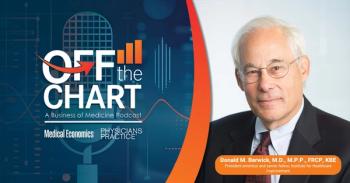
The Critical Need to Reinvent Primary Care
It is time for primary-care physicians to step up and lead the many other providers who provide direct care.
One of the most critical problems we face is not a physician shortage, it is a shortage of critical thinking.
For example, Kathryn Serkes, the CEO of the Doctor Patient Medical Association, makes a central point about the legislative battle raging over advanced nurse practitioner supervision in five states: “… the current legislative battle is about 'oversight' and who will control whom within the old paradigm instead of encouraging innovative ways to take care of patients that will both lower costs AND increase access.”
Rising above the fog of the hundreds of petty battles aiming to tweak a healthcare system stuck in the past provides a surprisingly clear view.
Using Serkes’ example, rising above the fray reveals that the issue is not about oversight, it is about the central role nurse practitioners and others should play in improving the quality, access to, and cost of care, and the role is immediately clear - primary-care physicians are too important in the management of truly complex patients and the overall health status of their patients to be monitoring blood pressure or treating sore throats.
Nurse practitioners and their peers are too important to be doing those tasks as well, but, that is not really their role. In the process of treating things that would get better anyway, their job is to both identify the things that won’t and to collaborate with other care providers to ensure that they don’t get worse.
The bottom line is that if we are to bend the cost curve and to improve outcomes, we need to both improve the personal delivery of care and access to it and the cost of providing it as a team, not as competitors.
Nicholas Bonvicino, MD, who is playing a central role in reinventing the continuum of care, says that physicians have to wake up to the reality that the role of primary care must change. It is no longer reasonable to expect primary-care physicians to be direct-care providers for the majority, but to "specialize" in caring for complex patients who need coordinated services for multiple chronic and acute medical and behavioral conditions. Less-direct patient care, Bonvicino argues, but highly critical ones.
The role of the primary-care physician must be taking accountability for population health. That means identifying high-risk patients and concentrating on their outcomes both medically and economically. At the same time they need to step up and assume leadership responsibility for the many other providers who will be needed to provide direct care services. Unfortunately not all physicians are willing to reinvent themselves. They, and many others, would like the benefits of the awakening of the importance of primary care without the need to change a comfortable historical business model.
Advanced-practice nurses, physicians assistants, and nurse midwives also have to be willing to change. Whatever the jargon settles into, midlevel providers, physician extenders, or alternative primary-care providers have certain strengths that must be realized and taken advantage of if we are to truly reengineer healthcare. They are more humanistic, express more caring and compassion, and often make strong personal connections with their patients. They also appear to be, by nature and training, more compliant with providing care through a structured, guideline driven approach.
Bonvicino argues that if one is going to design a more efficient delivery system, one would want first line providers to be masters of the commonplace (and not bored by it), willing and able to treat the common through a system that standardizes care and optimizes outcomes, utilizing the least amount of resources to get the best health status. Nurse practitioners and the others should not look to replace physicians in their current roles, but rather forge a new frontier by developing a new provider model that specializes in providing structured, reproducible, evidence-based care in a manner that reduces the unit cost of provision, and frees physicians for population management accountability and the truly high risk and complex.
Primary-care physicians should not only support this important role, but work with midlevel providers to make it happen.
Newsletter
Optimize your practice with the Physicians Practice newsletter, offering management pearls, leadership tips, and business strategies tailored for practice administrators and physicians of any specialty.






